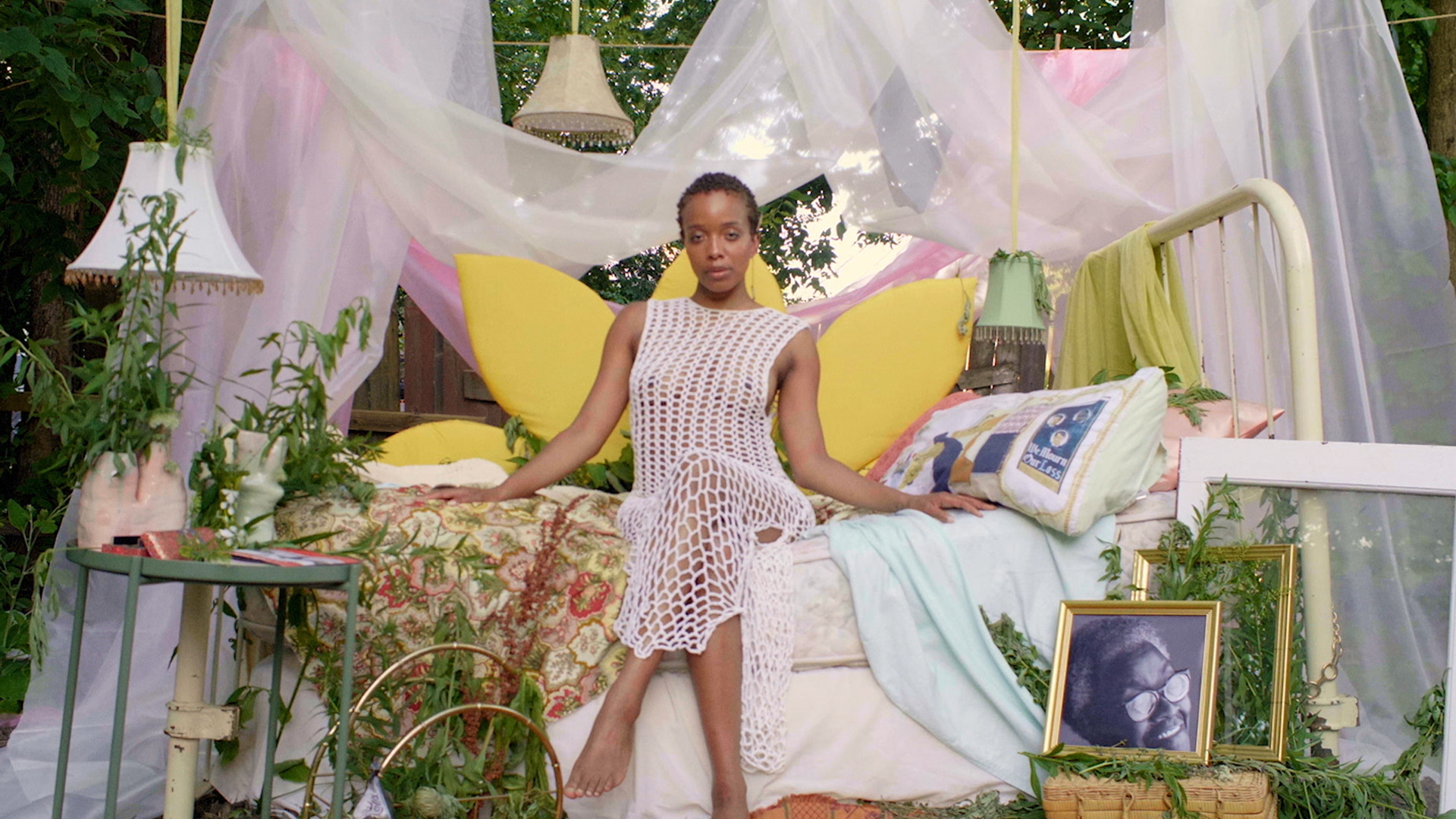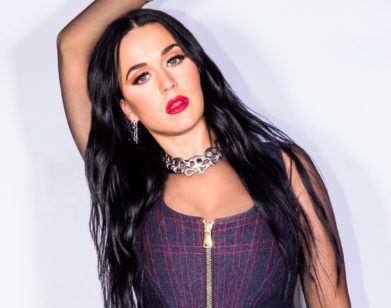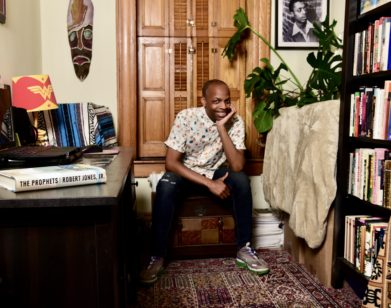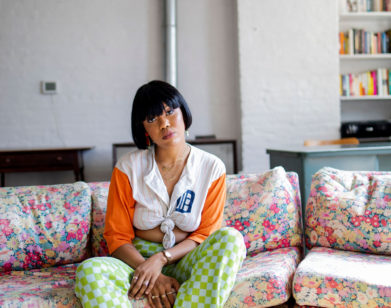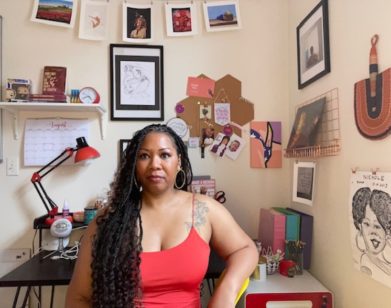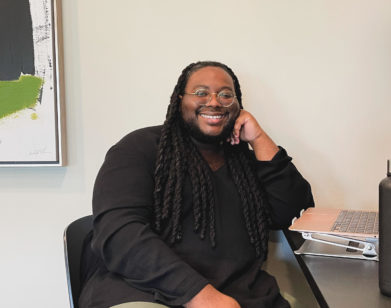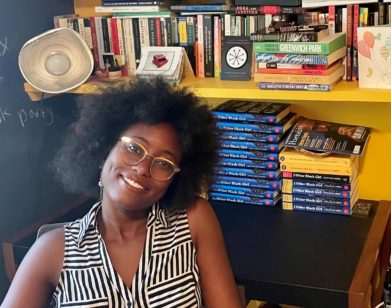in conversation
Jamila Woods and Fatimah Asghar on Desire and Intention
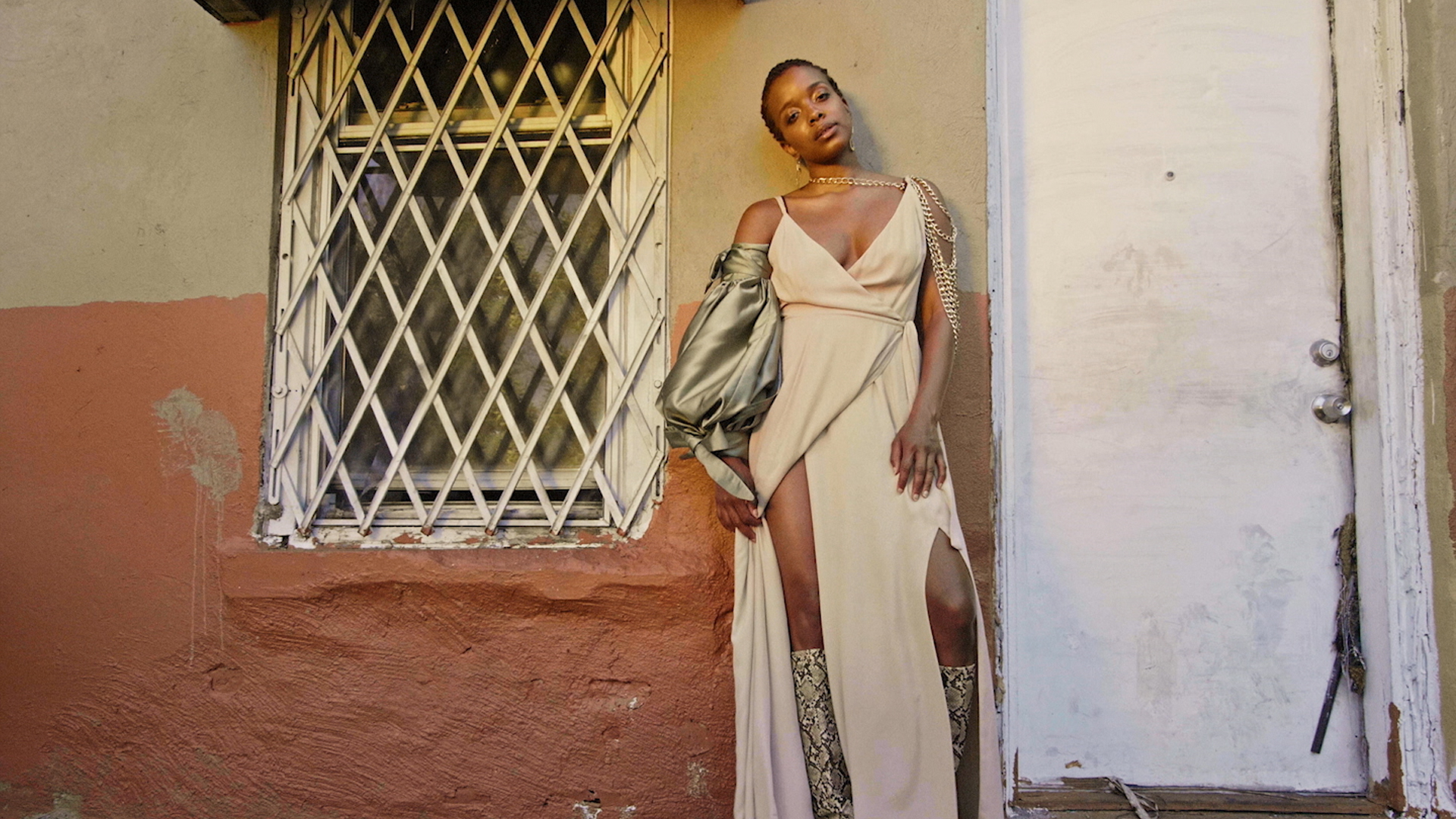
“SULA (Paperback),” directed by Fatimah Asghar.
Jamila Woods is constantly raising the bar for herself and her art. Last year, she released her album titled Legacy! Legacy!, with songs named after prominent Black figures such as Nikki Giovanni, Sonia Sanchez, and James Baldwin. Her latest single and video titled “SULA (Paperback)” keeps up this tradition and pays homage to the book Sula, by Toni Morrison. The video, directed by Woods’ friend and writer Fatimah Asghar, is both a beautiful and moving tribute to the late writer and a love letter to Black women. Images of pioneers like Lorraine Hansberry, Nina Simone, and Assata Shakur are seen throughout the video as Woods strips naked, surrounded by books and artifacts. Below, Jamila and Fatimah talk about making the music video, the politics of desire, and the power in taking artsy nudes. —JULIANA UKIOMOGBE
———
JAMILA WOODS: Hello, Fati!
FATIMAH ASGHAR: Hi! How are you?
WOODS: I’m doing okay. I just had therapy. I’m feeling tender. How are you?
ASGHAR: I’m good. I was telling you before that my back is kind of in pain because I’m old. [laughs] But, I’m doing good today. I think my first question is just what prompted you to write the song? What was the inspiration? What went into it?
WOODS: I know ever since a little over a year ago when Toni Morrison passed away, someone had suggested to me, “Oh, would you write something to commemorate her in the spirit of Legacy! Legacy!?” And at the time, it didn’t feel like I could just churn that out, and I was still processing. But then, I was reminded of Sula and thought about the ways that that book in particular influenced me. When I was first starting to put together my first collection of poetry, it was inspired by this line from Sula: “I did not hold my head stiff enough when I met him, so I lost it just like the dolls.” It was all about this navigation of power and autonomy in my own body. So, I was like, “Maybe instead of writing a song trying to encapsulate everything that Toni Morrison means to me, why not just meditate on that particular work instead of her whole self.” I kind of just looked at quotes from it and it really struck me. The things I’d been struggling with, the things about seeing all of my friends having babies or getting married, and the ways I had been questioning what I should be wanting, and what I actually want. I remember thinking about that a lot, and thinking about the idea of goodness and the types of things that Nel and Sula struggled with, and how I would approach that. I wanted to write a song meditating on those things.
ASGHAR: Well, let’s talk more a little bit about the idea of goodness that you’re talking about. What do you mean by that, in terms of both Nel and Sula, but also for yourself?
WOODS: Yeah, I think of the line in the song, “promiscuous, holiness, slope is slippery.” I think growing up in church, there was this idea of your body needing to be something that you hide and protect in order to be good. And also thinking of what my contribution is to society and often for women, there’s a pressure to have a child. That’s just the thing that is expected. For me, being in a relationship for a long time, it felt like this momentum towards what was expected of me, and that turned me off of the idea of motherhood. And then, being single and rediscovering all these ways that I think I love nurturing and kids, I might want to be a mother one day. But I want to define that for myself.
ASGHAR: That makes sense. I deeply relate to that. It’s so interesting to think about all of the ways that we have to shed the narratives of what is expected of us and to really listen to ourselves be like, “What do I actually want versus what is being told to me is the thing that I want?”
WOODS: When I read what you wrote about the video, I loved the part where you said, “Who do we give ourselves permission to be when we’re alone?” So, how has quarantine or self-isolation affected your relationship with your body or with your sexuality and sensuality?
ASGHAR: I feel like I’m on a really deep healing journey with my body, and especially in regards to sexuality and eroticism. It’s so deep. You know this because we’re wives, so you know all of the things that’s going on in my messy-ass mind. I historically have this relationship to my body that has often been defined by other people, and so there’s this part in Sula about learning your body through someone else’s eyes and learning your body and sexuality through having sex with people, which I very deeply relate to. I think that so much of my body, so much of the way I perceive my body, so much of the way I perceive my own desirability, my attraction has always been through relationships and fucking and people that I’ve been with. I think that in quarantine in particular, I was like, “Whoa. Here you are, and there’s folks that you’re kind of seeing and dating, but for the majority, you are not partnered up, and you are alone, and what does it mean to have a relationship with your body that is outside of someone else’s sight?” It’s been such a journey. There’s been so many beautiful things, and there’s been so many painful things, and so many things that make me deeply afraid. Something that I really started to do in quarantine was develop this relationship that was really about my own pleasure and was really about my own freaky shit that’s not on someone else. It’s kind of amazing to explore kink with yourself, to be like, “Okay, cool, what does it look like to tie myself up? What does it look like to seduce myself?” It’s such a different way of relating to the body. It’s such a different way of relating to desirability, and I think particularly for people who are women and femme, and particularly for people who are women and femme with color, we are so often taught that our worth is dependent on someone else’s sight. It’s been such a revolutionary act for me to be like, “No. I am my own body and I am my own worth, and I can have that.” That has just been a really deeply kind of spiritual place for me. What about for you?
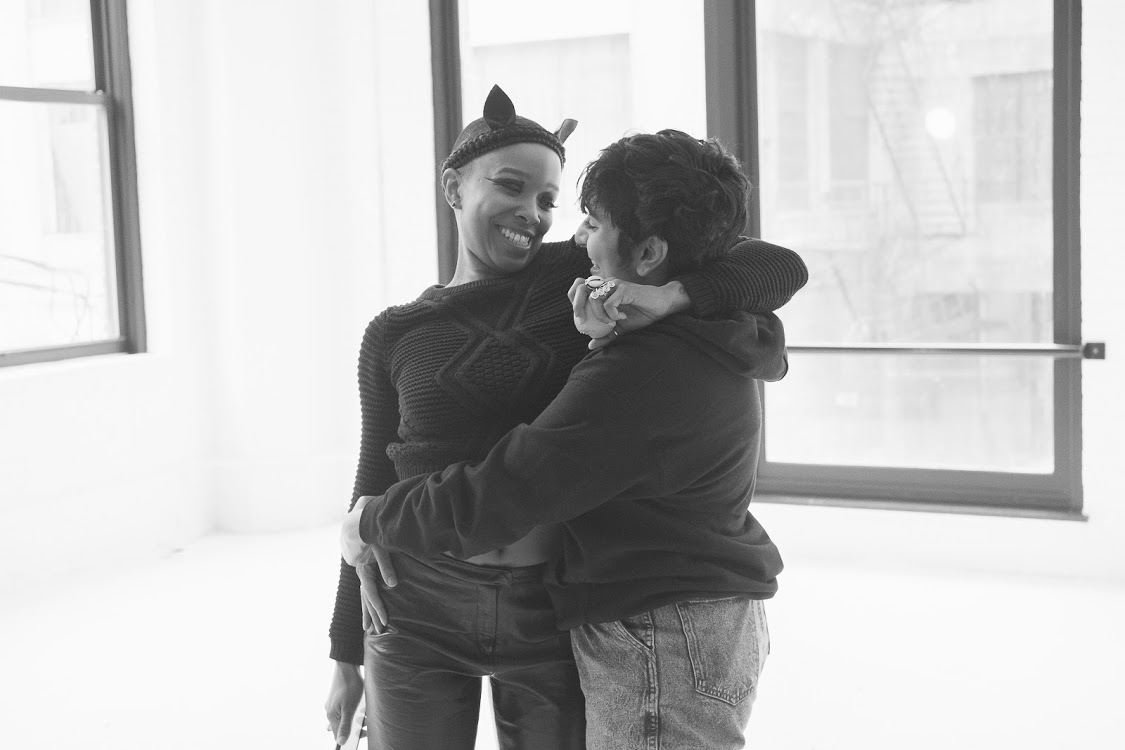
Photos by Mercedes Zapata.
WOODS: I really resonate with a lot of what you said. I loved that part in Sula where it talked about Sula in having sex with men. I read it as it’s almost not about them. They just gave her a portal to know herself deeper, and like you were saying, we can also do that for ourselves too. I love that. I think for me, we take a lot of nudes, we show each other our nudes. That’s been a really fun part of quarantine to me. And also, me recognizing the ways that I look at myself in the mirror often can be more critical and less forgiving than when I’m taking a nude or when I’m making a video of myself. When I present myself to myself in that way, I’m able to see myself in a different light, which has been really a part of seducing myself I think in quarantine in a cool way. When you said that, it reminded me of how you were talking about the way you conceptualize the video, and you were inviting me to think of the camera as me or inviting myself in. Do you want to talk more about how you came to the idea?
ASGHAR: I think that right before quarantine started in March, you and I were in Chicago together, and we were getting to shoot two of your new videos together, and it was going to be for the year anniversary of Legacy! Legacy! coming out. The day before we were set to shoot, our DP got sick, and we were like, “Oh, shit.” It was pre-lockdown, nobody had masks, we didn’t know what the fuck was happening. And then it was like, “Okay, cool. This isn’t going to work right now, and maybe this will be cleared up in a month or whatever. We’re not sure.” And I flew back to L.A. There’s such a loss when you conceptualize something and you’re already so excited for it artistically, and then you can’t make it. That’s such a death not to be able to make your own work. And so, I think we were both really in that mode, and a lot of quarantine has been uncertain for artists because it’s been like, “When can we make things again and what does that look like?” For so much of us, that sense of making and creativity is a huge part of our self-purpose. It’s a huge part of who we are. So, I came back to Chicago to be with you, and we were living there, and there was so much beauty in our neighborhood. So, as we were conceptualizing the video, originally I was still thinking of the location that we had for the old video that we were going to shoot. And I was like, “We’re going to do this in our neighborhood. We’re going to do this where we live and with all the people that we’re neighbors with.” We used our neighbors lot and I loved that it felt like a secret garden. So much about what I love about Sula is the interiority of your own world being made exterior. I was really looking at a lot of Deana Lawson photos. I was thinking, “What does it look like if we take the inside and we put it out? What does it look like if we can make an apartment, this whole living space, in this backyard? What does it look like if we can strip you down so that you’re naked and look at these things that are considered taboo and private?” I think for you, this is a really different music video. It’s both a continuation of your aesthetic, but also stepping into a new space. What did it feel like to do that and what were your fears and what were your dreams and what was the process like for you?
WOODS: I’m really grateful to have been able to do it with you. I can’t imagine not doing it with you. I think my fears were layered. With quarantine, no one gets to do their body grooming that they want to and I haven’t seen my barber in so long. Things like trying to figure out how to be confident in my body was the fear that I wouldn’t look confident or I wouldn’t like the way my body looked. In my art, my image is partially constructed by me and partially constructed by the audience or critics. And then, it feels like there’s a private me, and I think I dreamed of feeling more free to walk between those things and not have those things be so separate, and I think it was you who was telling me about the meaning of integration. That’s about integrating all parts of yourself, and having that wholeness, and that’s something that I have written a lot about. I wanted to feel that for myself, and thinking about Toni Morrison’s documentary, and the part where she’s like, “Yeah, I went to college, and I was fucking everybody.” Just seeing that moment of her was so valuable to me because she’s more than just any one way that folks might see her, and I want to have that for myself too. I think that was my dream and the fear I think is related to how it’s perceived when women or femme people take their clothes off or are sexual or sensual. And even thinking of my family or my students, what would they think? I had to kind of also reckon with the way I’m hyper critical of myself. I think that was part of the dream, too.
ASGHAR: Yeah, definitely. I think our minds are such deeply painful places sometimes because we’re so critical. Even in quarantine, you see my nudes. My nudes are artistic as fuck. They’re like really intense nudes because that’s what turns me on, to think of this as an artistic project. I think of my body that way. There’s so many that I would take, and then I would be like, “Oh, but I can’t send that to someone I’m fucking because I don’t look good.” And then days later, I would look back at them and be like, “What were you doing to yourself? Why are you so afraid of sending this photo that’s not perfect to someone that you’re fucking? Why are you that afraid of someone that you’re intimate with? Why do you feel like you have to be perfect in order to send that out?” And thinking about all of the ways that we do that to ourselves. Being like, “Why do we have to think that we have to not have a single scar on our body to be considered beautiful? What is that impossible weight that we’ve put on ourselves and where did it come from?” And just really thinking about that, thinking about how to detox from that.
WOODS: Do you feel like there were things that you were insecure or worried about or that you hoped for in this process of making the video?
ASGHAR: Absolutely. I’m so critical of my own art. I’m so deeply critical and damaging to myself when I talk about it. And I don’t celebrate my own art often. Directing is new to me. I’m so deeply critical of the things I don’t know, and the ways that I am not good at certain things, and the way that I can be impatient around both my knowledge and the moment. I felt really nervous going in, and it was also just a deeper healing process for me because I think slowing it down, we built up that set over the course of a week. We had the time to do that, and the gratitude to do it, and everybody on set, it was this magical feeling of everybody being like, “I haven’t been able to make art in months, and I’m making art right now, and I’m making it with mostly queer people of color, queer femmes of color.” Did the process of making the video change your relationship to your body? Particularly also thinking about the fact that we’re in the middle of a pandemic and an uprising, how were all of those things kind of impacted towards you and your vision of your body in the moment?
WOODS: I think it’s definitely been useful, speaking of the slowness, how from the time that we were shooting the video to seeing even the behind-the-scenes photos to seeing several drafts, how my initial reaction to seeing my body was super self-critical. Now I look at it and you can see my keloid scar, you can see my tummy. I’m now appreciative of those things. Thinking about quarantine, in the beginning, I had all of these really great goals of going to do yoga every day. Then I started to notice how something that you’re thinking about as self-care can start to feel almost a little bit toxic. I was like, this ritual is becoming a rubric and I’m looking to see if my stomach is getting flat or if I’m getting more toned here as opposed to being just present and doing yoga, and enjoying it. I think the video gave me the gift of being able to observe the way that I look at myself. I think I still am very anxious and nervous, but there are so many other things to be outraged about outside of my titties.
ASGHAR: Every time I see the video,I’m so joyous that you can see that keloid. I’m so joyous that you can see those scars. It was so beautiful to see your skin. The fact that it’s not touched up is revolutionary. People are just reacting to you unfiltered, to not having it be so controlled. And to use natural light in that way, to not control the sun, to not control the lighting.
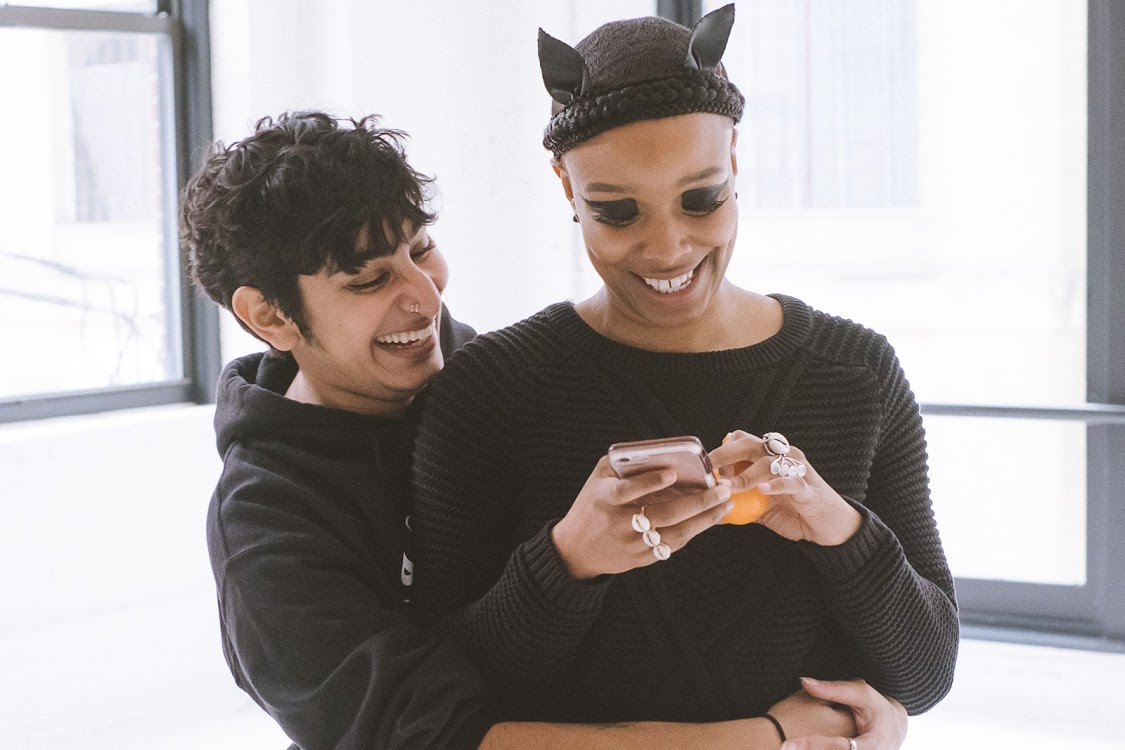
WOODS: Did you learn anything about yourself, either as a director, artist, or person during this whole thing?
ASGHAR: Yeah. I feel like I did. I think that I learned a lot about intention. I think sometimes creating music videos, there’s kind of a way where I think people think of them as like, “Oh, just make this thing.” The kind of output that people have towards it, they don’t act like they’re precious. And to me, they’re so precious. You know, when we were in college, you would make fun of me a lot because I would just spend an entire afternoon just watching music videos. I love them. I love them so deeply. But I think that they’re such intentional pieces of short film and work, and it felt really amazing to be able to have this level of intentionality that I hope for in a project, and I think that that felt really, really good. I think I just really freed myself up of being able to make mistakes. I’m such a perfectionist, and I’m always like, “If you can’t do it right, you just can’t do it.” I would get annoyed by things I did. You always see it in the edit is when you’re like, “Fuck, if I had just framed this a little differently, if I had done this a little bit differently.” And even with that, I was like, “It’s okay. It’s okay.” Those are the things that you think that you could have done better on, and next time will be better on, but it’s okay. And I don’t know that I’m good at that usually. Usually, I obsess about it. I’m like, “Fuck, you’re an idiot. You didn’t do the rehearsal track, and that’s what fucked this up, and that’s just the problem.” And then I beat myself up, and I convince myself I’m a terrible human being, and I can’t get out of that hole. But in this one, I was like, “Okay, you didn’t do the rehearsal track. You’re right. You didn’t do it, and you should have done it, and now you know, and you can do it next time.” And that’s what the tracking shot will look like next time. Okay, great. And it was just the ability to just able to be like, “Great, you didn’t do it. Okay. That’s fine.” And just to move on from that really taught me a lot.
WOODS: I love that. I was also thinking about that idea of not wanting to be so precious about everything. My therapist was just saying because I was like, “I have so many doubts all the time. I’m always questioning and wanting everything to be perfect.” And she was saying, “There’s a healthy threshold for questioning, but to balance that with also belief in yourself and confidence.” I feel like usually I’m very imbalanced on the always questioning side. But I think this project is really helping me to even just acknowledge all the emotional work that it took to do it, and that’s might not be something that’s going to be seen necessarily, but it’s very invaluable and also something to be proud of.
ASGHAR: In film, people only see probably 10% of the thing that happened. They don’t see the process. I would not have done this without the process. I think that people are only going to see the product, and they’re going to be like, “Oh my god.” And then have their takeaways, and they’re going to have their narratives and their productions, but what we have is the process, right? Everything contributes to this process. Every single thing is part of the making of the work that we do, and therefore, we cannot get obsessed with what other people will think. All of this deep healing work around our bodies, a lot of this deep healing work around our own ability to think of ourselves as capable, and to think of ourselves as being able to do something. Our own ability to think about ourselves as autonomous people outside of the relationships that we have. That’s so difficult. It’s so difficult. And I think that this video encapsulates a lot of that I think for me.
WOODS: Yeah. I think so, too. Even just us talking about it right now is really dope because I think gearing up for the release, I was talking about that idea of being unpartnered and making very vulnerable work is a different task than doing it with a partner. Just thinking about what is that home base if it’s not a partner, and leaning into it more. Like you and me, you are that to me. I think my family has been that to me in other times, and dark noise, and so utilizing that instead of just feeling the lack of not having a partner.
ASGHAR: The interesting thing is you can be unpartnered and still be with community. You can’t make anything alone. You just can’t, especially not a film. The ability to collaborate and make work that heals, and not be partnered, it’s such a revolutionary realization that you can do that. I’m really proud of that realization for both of us. We have each other, we have these other support systems, we have this. I know this sounds so silly, but to come out of a relationship and be like, “I can still make work, I can still make art, I can still do this,” is so important. Your mind will have you thinking you can’t.
